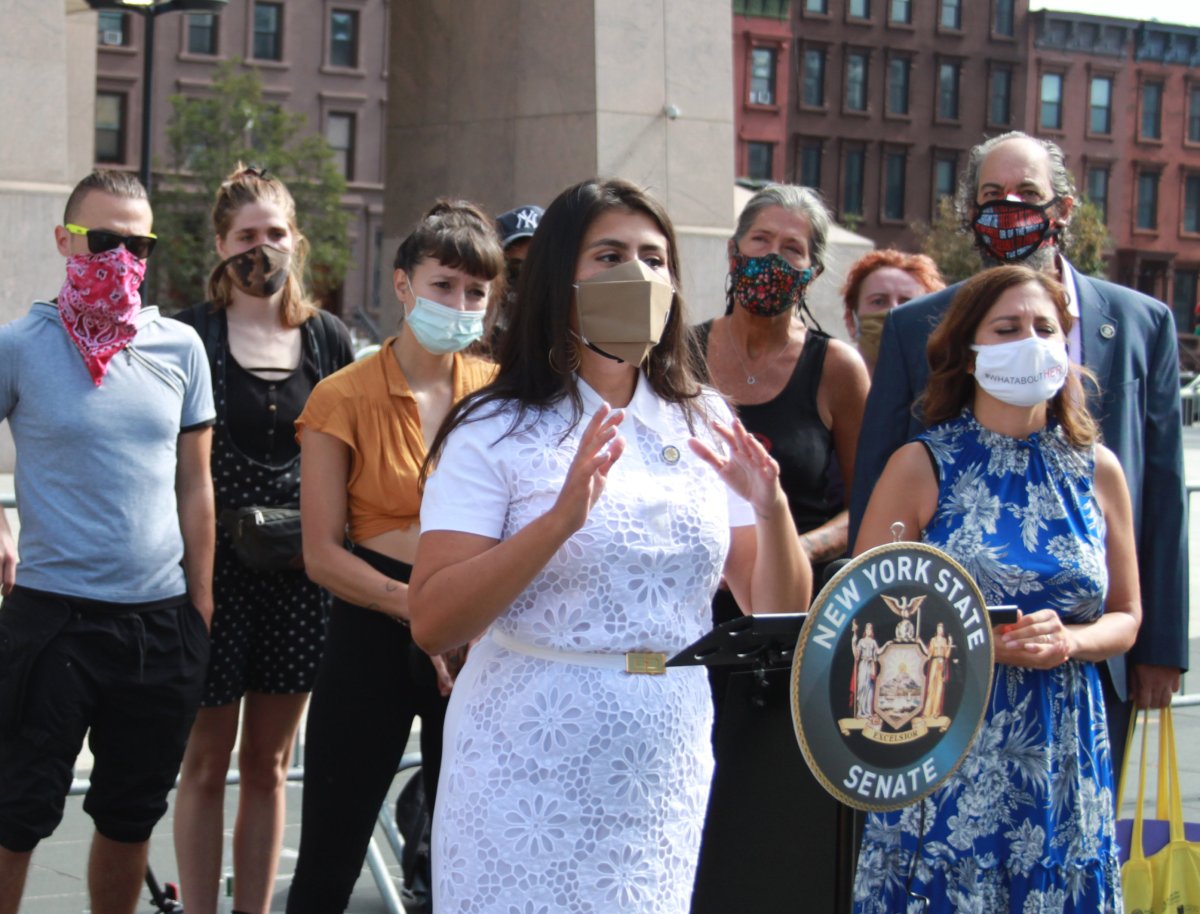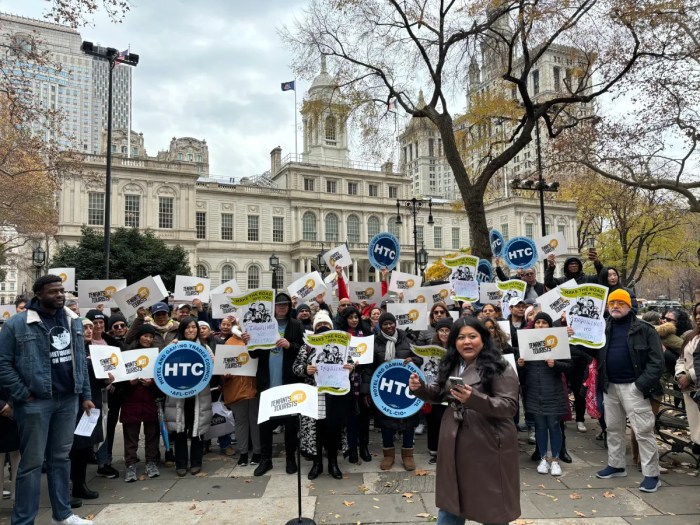Senator Jessica Ramos returned to the New York State Liquor Authority’s (SLA) headquarters on Thursday, Sept. 3, to call for the agency to restore all the liquor licenses it has removed from New York City restaurants and bars as well as drop all suspensions.
“The way to help these small businesses is not by suspending their license and closing them down,” said Ramos. “The way to help the businesses is to provide clear guidance so that we can help them comply if there’s any confusion, so that they can continue operating and they can continue providing us with good food, entertainment and, more importantly, good jobs for our communities.”
Ramos — who along with two dozen state senators wrote a letter demanding SLA stop hitting businesses with “excessive fines” last week — was joined by Uptown Manhattan Assembly member Carmen De La Rosa, Jackson Heights Assembly candidate Jessica González-Rojas and several local restaurant and bar owners.
Two weeks ago, Ramos led another press conference at the Adam Clayton Powell Jr. State Office Building with more than 30 Queens and Manhattan business owners to speak out against what they say has been harassment from the SLA in the months when eateries were allowed to reopen for outdoor dining.
The SLA has filed 708 charges for liquor license removals against establishments in NYC, 207 (or 29 percent) of which are in Queens, as of Friday, Sept. 4. Manhattan accounts for half of the charges, according to the SLA.
The agency has also filed 168 Emergency Summary Suspensions, which are imposed when the SLA finds the continued operation of a licensed business threatens public health and safety.
Businesses that are subjected to an emergency suspension are entitled to an expedited hearing before an SLA Administrative Law Judge.
SLA spokesperson William Crowley told QNS the suspensions are “used sparingly, and only in the worst cases — that’s why 50,000 inspections have led to under 1,000 charges and just 168 suspensions.”

But De La Rosa, who represents Washington Heights, said restaurant and bar owners in certain communities are receiving “targeted enforcement” from the SLA.
“Why are they targeting our businesses? Because they serve communities of color, because they serve vulnerable communities, under the guise of safety,” De La Rosa said. “We visited many establishments in Upper Manhattan, and these businesses are trying their very best every single day to not only serve their communities, many of them never closed their doors during a global pandemic. Let’s talk about essential workers. These people were part of food delivery operations, of mutual aid operations when our communities were dying. They are trying to survive. This is not about safety, this is about revenue.”

González-Rojas, who won the primary race for Assembly District 34, said her district’s majority-immigrant owned businesses “are suffering from the burden” of SLA fines.
“We are in the district that was deeply impacted by COVID,” González-Rojas said. “There’s a restaurant down the street from my home, I live right off Northern Boulevard, and I witnessed it getting shut down for days due to fines. I witness another restaurant get a $1,500 fine without any proof — and when they ask for proof they got a grainy photo that shows nothing. This is unjust.”
Ramos said about 31 businesses in her district have experienced “harassment and threats by undercover agents, members of a task force, the state sheriffs, and the Departments of Transportation and Environmental Protection.”
Kae Burke and Anya Sapozhnikova, co-founders of Brooklyn’s House of Yes, a nightclub and arts space, were there to talk about their liquor license suspension a week ago. They said they were given a list from SLA on what to improve.
“We did make the changes, we did try to rectify the situation, and they still suspended our license,” said Burke. “That is not justice; it’s not helpful. That does not keep our communities safe. All that does is destroy a business that was completely compliant with all of the guidelines. It’s heartbreaking to see our friends all of a sudden, surprise, unemployed again.”
Abby Ehmann, owner of Lucky, a bar on the East Village, said she recently got her liquor license suspended shortly after she started a petition, “Seating Not Eating,” calling on Gov. Andrew Cuomo to reverse his Executive Order mandating restaurant and bars have to serve food item with alcoholic beverage. The petition has surpassed 5,000 signatures.
Ehmann’s lawyer, Wylie Stecklow, argues that while Cuomo’s executive orders have effectively slowed the spread, they are not always easy to understand or enforce.
“Even before COVID, they were looked at by the Department of Health, Department of Buildings, the Fire Department, as well as the State Liquor Authority. These businesses know they have to comply with a myriad of rules and regulations that are hard to understand,” said Stecklow. “Executive Order 202.52, it is so undistinguishable, it does not define itself, that the The SLA has set up 10 question and answers on their own website trying to explain what this one small executive order means.”
President of the New York State Latino Restaurant and Bar Association Jeffrey Garcia joined many businesses and elected officials across the city in calling for a clear path for NYC to bring back indoor dining.
“Our restaurants know they should be wearing masks, cleaning tables and following all these rules, but there are a lot of things in place that’s a hindrance as well,” said Garcia. “Like the rule that business have to control what’s going on 100 feet from their businesses — they’re not cops. Just trying to control people inside your businesses is difficult enough during these very difficult times, because even customers, even though we’ve been dealing with this for months, are not always used to putting on a mask right away. Yet an investigator can walk in as a person’s walking to the bathroom, and you lose your license over a free mask? It’s just not fair.”

Ramos agrees that indoor dining should come back, saying that as a mother of two, she’s more worried about what in-person school protocols will look like in the fall.
“We’re going to be allowing a third of the student population to go into schools with little to no protocols,” she said. “I do not subscribe to these concerns about indoor dining when we are being hypocrites in New York state and allowing everybody but New York City to reopen at a small capacity and now we’re behind New Jersey as well.”
Ramos and Assembly member Yuh-Line Niou, who represents Chinatown, previously called for better outreach and for guidance to be given to business owners in several different languages.
“As of yet, the SLA has been unable to provide clear guidance in one place as to what rules and protocols our restaurants must follow,” said Ramos. “None of this information is available in any language other than English. The SLA is still deputizing state employees from other agencies who are not trained in liquor authority law and are not culturally competent … because they don’t live in our neighborhoods and understand our communities.”
Suspended licenses may cost business owners anywhere from $4,000 to $50,000, depending on “egregiousness of the conduct.” The maximum penalty the SLA could hand down is revoking a liquor license.
For first time Executive Order violations involving less egregious conduct, the SLA generally accepts fines anywhere from $1,500 and $4,000, with the maximum being $10,000 per charge.
Ramos added that it is not clear where the fines that SLA collects are going.
Crowley maintains the SLA and Cuomo’s task force for a safe reopening are acting in order keep the public safe during the pandemic. He said thanks to the task force and responsible business owners, the SLA is seeing a 97 percent compliance rate.
He noted all fines, in addition to all licensing revenue collected by the SLA, are remitted to the state’s General Fund — the major operating fund for the state, which provides funding for schools, healthcare and other services.
“The SLA has had uniform standards for bars and restaurants from day one — posted publicly on our website — and they have been on the books for months,” Crowley stated. “Let’s be clear: we only suspend licenses in the most egregious cases of non-compliance, which is why nearly 50,000 inspections have led to just 168 suspensions. […] We will continue to take a smart approach to compliance — working with businesses that truly want to keep New Yorkers safe, while taking strong action against the small number who willfully violate coronavirus-related regulations, placing both lives and New York’s re-opening at risk.”
But Ramos said the task force, which has SLA, the sheriff’s office and other state agencies involved, doesn’t seem to have anyone “explicitly in charge that can say how these inspections are being carried out in order to provide clarity” for the protocols required of restaurants.
“We’ve been given the time to rethink and re-design the way we do many things,” said Ramos. “How we help our small businesses needs to be a priority. We should be encouraging more New Yorkers to open small businesses and provide them with the support they need to keep them open. We need more New Yorkers to create, to be entrepreneurs, to be able to help and provide jobs for their fellow New Yorkers.”





































